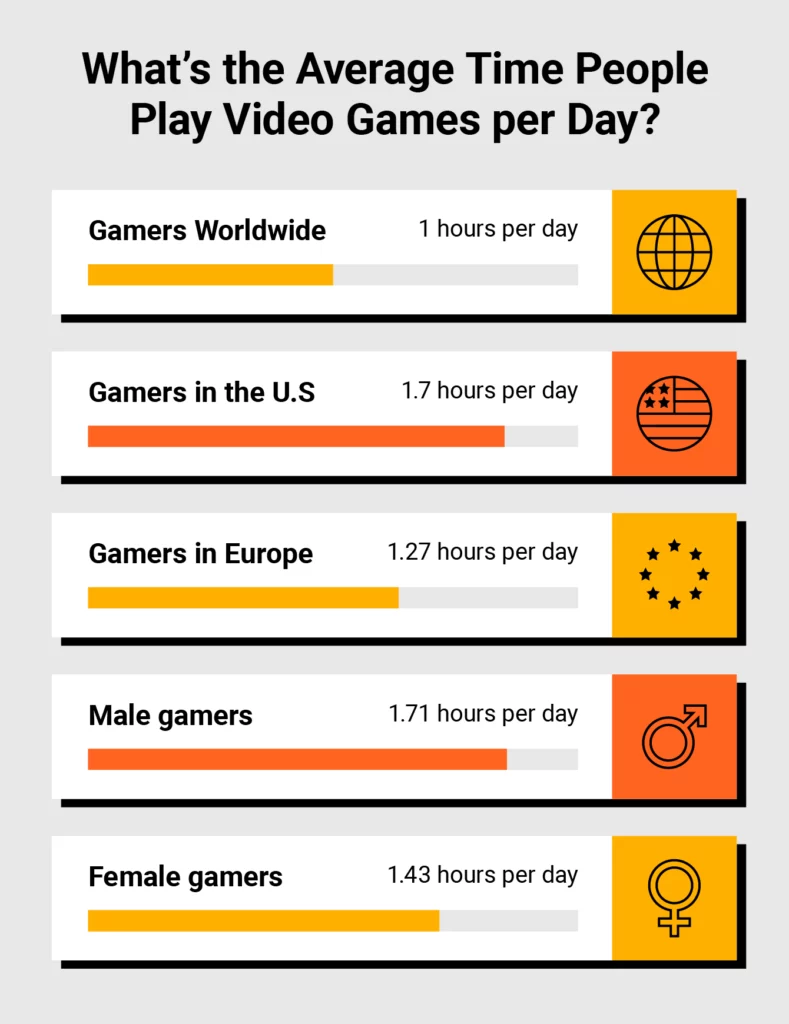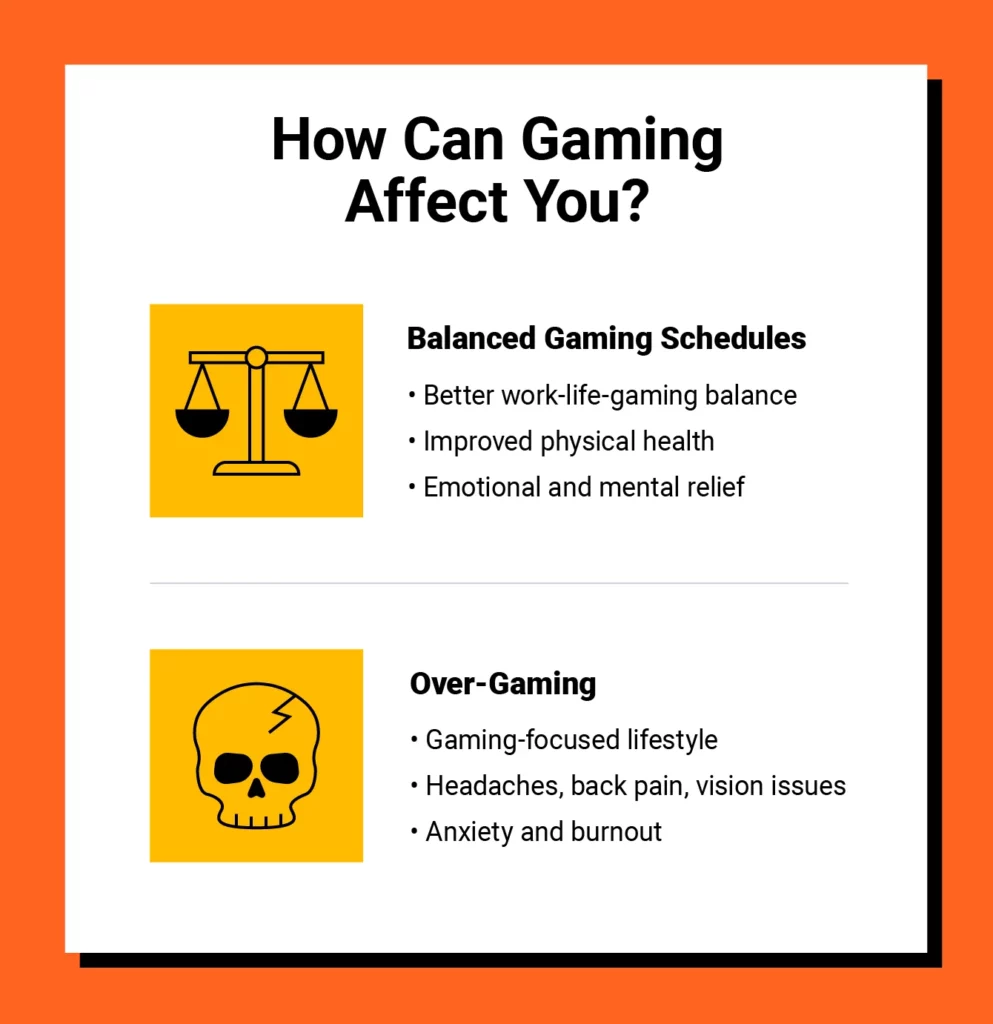
Daily video game playtime varies between age groups. Based on a 2021 study, most school-aged children spend around 1.1 to 4.3 hours each day playing video games. However, for those ages 15 to 24, daily playtime looked more like 58 minutes per day in 2023.
Gaming is a pastime for billions worldwide, but how much time are people really spending on video games? And how much time is considered too much? Video games can be a great hobby, fostering healthy communication and socialization, improved cognitive performance, and a variety of other benefits. However, moderation is essential to ensuring you reap the benefits of daily video game playtime while minimizing the risk of potential negative effects.
Below, we’ll discuss the facts surrounding video games, including the average time spent playing video games per day and the data-backed effects of long gaming sessions, both positive and negative. We’ll also dive into some tips for balanced gaming so you can enjoy your favorite pastime while keeping other important parts of your day in mind.
The Average Time Spent Playing Video Games per Day
Knowing how many people play video games daily and how long they spend playing depends on several factors.
Worldwide, billions of people of all ages enjoy playing video games, from PC and console titles to mobile games. In fact, there are an estimated 1.1 billion online gamers globally. While nearly every country hosts a significant population of gamers, not every country games the same way.
According to the Entertainment Software Association:
- 212.6 million people in the United States alone play video games for at least an hour each week.
- Americans spend an average of 12.8 hours gaming each week across all platforms.
- 75% of American gamers play for at least four hours each week.
However, the United States isn’t the only country where video games make up a large portion of free time. Here are some gaming statistics from around the world:
- Of the estimated 1.1 billion players, China, South Korea, and Japan have the biggest online gaming reach. (Statista)
- According to a 2022 survey, Chinese gamers spend an average of 11 hours playing games each week, while Indian gamers spend only six. (Statista)
- In 2024, people in Egypt spent the most time on console games each day, with an average time spent playing video games per day of 1 hour and 55 minutes. (Statista)
- Europe is home to a significant number of gamers, with an estimated 124.4 million players, according to a 2023 study. (Video Games Europe)
- Brazil has the highest number of players in Latin America — an estimated 136.6 million. (Statista)
But video game reach goes beyond global statistics. Not only are individuals in different countries picking up a mouse or controller each week to enjoy a few hours of playtime, but so are individuals across different demographics.
The average gamer today is a lot different from those of the past. Gamers of all backgrounds and ages can enjoy video games. In fact, according to a 2024 ESA study, 29% of players in the United States were over the age of 50 — a generation that saw the release of some of the highest-grossing games.
Here are some more age-based statistics at a glance:
- The average age of players in the United States was 36. (ESA)
- More than 90% of individuals in Gen Alpha and Gen Z play video games. (Newzoo)
- 62% of Americans over the age of 18 play video games. (ESA)
- Of the 85% of American teenagers who play video games, 40% play daily. (Pew Research Center)
- In 2004, only 17% of Americans over the age of 50 played video games; in 2024, this number is closer to 29%. (Pew Research Center)
One 2022 study found that video games are becoming more popular, and many statistics show how massive gaming is.

Gaming Sessions: How Long Is Too Long?
When it comes to understanding balance and moderation, you may wonder how long you should play video games. And how much gaming is too much? Unfortunately, there’s not a single number that automatically becomes “too much” time spent on gaming.
Instead, several factors can separate an unhealthy gaming session from one that’s well-balanced. This includes the game itself, as a long session for someone playing a high-paced online multiplayer FPS may look different than someone playing a casual idle game.
As a result, instead of looking at the quantity of your gameplay session, it’s important to look at the quality, including how gaming fits into your daily life and makes you feel.
One of the first places to look for the negative effects of over-gaming is your health and mental state. These effects can be key indicators that your gaming sessions went on a bit too long, as well as other concerns such as a lack of an ergonomic setup or posture problems. Here are some issues that may arise from over-gaming:
- Players who spend too much time playing may experience dry eyes or even wrist and hand injuries. (Salus University Health, University of Maryland Medical System)
- Eye strain is also common among gamers, which can cause headaches or even difficulty concentrating. (Harvard Health Publishing)
- Excessive gaming may also lead to mental and social concerns like irritability. (American Psychiatric Association)
Too much gaming can be harmful, but that doesn’t mean you should cut out video games altogether. Instead, learning to recognize when it’s time to stop and practicing healthy habits can help you enjoy games in a balanced way.

How To Balance Your Gaming Time
With so many players spending so much time gaming across the globe, you may be wondering how to best manage your game time. After all, moderation is essential, and finding balance doesn’t mean giving up your favorite pastime or missing out on the most popular games.
Instead, here are some tips to help you balance your gaming time, as well as some tips for healthier gaming:
- Prioritize time management: Time flies when you’re having fun, and it can be easy to immerse yourself in a game for hours without realizing it. To help manage your time, try establishing a schedule and using timers to remind you when to take a break. It’s also important to prioritize essential tasks, like work and school responsibilities.
- Practice healthy gaming habits: Sitting at the computer for long periods can take a toll on your physical health, even causing pain. When gaming, make sure to practice good posture and use an ergonomic setup when possible. It’s important not only to take breaks for time’s sake but also to rest your eyes and move your body.
- Don’t neglect sleep: One study found that 60.1% of adolescents prioritized video game success over sleep. As tempting as it can be to play into the late hours, it’s important to practice moderation and self-discipline with your game time. This means ending your playtime sooner to ensure you get the right amount of sleep each night.
Benefits of Balanced Gaming
As we discussed above, too much gaming can take a toll on your mental and physical health. However, gaming as a hobby isn’t all negative. When done in moderation with healthy habits, gaming can offer players a variety of benefits. This includes those specific to the game itself as well as mental and social benefits.
Here are some of the benefits of balanced gaming:
- Improved gameplay: Have you ever felt sluggish a few hours into gaming, missing skillshots and having slower reflexes? When you create a schedule with plenty of breaks, you can actually improve your gameplay. This is because it allows you to rest your eyes and reduce fatigue, boosting your focus.
- Positive effects on well-being: 67% of American gamers play to have fun. Balanced gaming sessions can exercise your mind while giving you a fun way to pass the time, boosting your well-being.
- Stronger social connections: According to the ESA, 74% of American gamers play with others, and 55% believe that video games can help you find new friends. Playing games can help you develop stronger social connections, especially when you’re playing games with friends that rely on teamwork and communication.
Immerse Yourself in New Worlds Without Losing Track of Time
Gaming offers the opportunity to embark on endless virtual adventures, providing immersive worlds that feel lifelike. And the good news? It’s possible to reap the benefits of gaming and enjoy your playtime in a healthy way.
Taking breaks, practicing healthy habits, and being mindful of your time lets you enjoy video games without losing track of time. If you’re ready to dive into your next title, there are hundreds of games available to play today.
Daily Gaming FAQ
Whether you’re an avid gamer with a love of the best building games or a novice learning the ropes of your favorite console, you may have some additional questions on game time each day. Below, explore some of the most frequently asked questions about daily gaming, including when excessive gaming may be a concern.
How Many Hours of Gaming a Day Is Normal?
While the average American spends 12.8 hours a week playing video games (an average of 1.82 hours per day), this isn’t the same for every demographic.
“Normal” daily game playtime varies from person to person. What may be a normal amount for one person to play may not be the same for another based on age and other factors.
How Many Hours of Gaming Is Considered an Addiction?
Video game addiction is actually a type of internet gaming disorder (IGD). According to the World Health Organization, for someone to have an addiction to video games, their behavior must be severe enough to cause difficulties in their daily life for at least 12 months.
As a result, some people may be able to game longer than others without seeing consequences in their day-to-day life. This is especially true when they practice healthy habits.
How Long Should a 15-Year-Old Play Video Games per Day?
Video games can be a fun way for teenagers to destress after school or spend their time on the weekends. However, if your child spends all their time online, you may wonder how much is too much for a 15-year-old.
There is no set time limit on screen time for teenagers. According to the American Academy of Pediatrics (AAP), children of all ages can have different experiences with media, whether that’s playing video games, watching recipes online, or communicating with loved ones. The AAP instead recommends that you pay attention to the quality of your child’s screen time, not just the quantity.
How Many Hours of Video Games Is Healthy for Adults?
Just like with teenagers, there is no single time limit for adults when it comes to video games. Instead, pay attention to how you feel during and after gaming, and also consider your day-to-day responsibilities.
If you find yourself missing out on time with loved ones, missing deadlines, or not feeling your best mentally or physically, you may want to try a different schedule with reduced game time.









